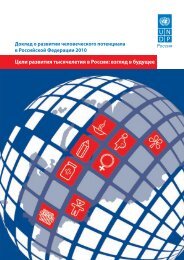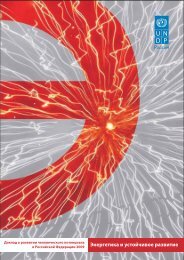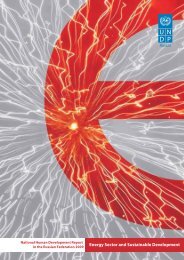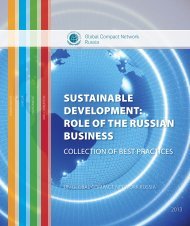Report - UNDP Russia
Report - UNDP Russia
Report - UNDP Russia
You also want an ePaper? Increase the reach of your titles
YUMPU automatically turns print PDFs into web optimized ePapers that Google loves.
countries, which have undergone industrialmodernization and where household incomesdepend mostly (80%) on wages. But theprincipal difference in <strong>Russia</strong> was absence ofincomes from business and property. Incomesfrom these sources rose to 20% of all personalincomes in the first years of <strong>Russia</strong>’s marketeconomy and remain at that level now (Table3.1). Access to these sources of income wasthe main positive effect of markettransformations and led to acceptance ofreforms despite double reduction of realincomes. Business activity was at its maximumat the beginning of market reforms, when itbrought 16% of all personal incomes. Duringthe economic growth period, relative weightof business incomes tended to shrink and bereplaced by income from property, whichwere then heavily depreciated by the currentcrisis. Business and property incomes explainwhy total income growth exceeded wageincreases during the first years of economicrecovery.There was a clear decline of realincomes in 2008 (Table 3.2). In December2008 they were 88.4% of their level inDecember 2007, although the observablepart of real wages even rose slightly (101.8%of the December 2007 level) and pensionsrose considerably (109.5% to December2007). So the fall in real incomes was due tosignificant reduction of unofficial wages, andof business and property incomes. Thisstructure indicates that high-income groupswere hardest hit in the first months of thecrisis, mainly through loss of regular annualbonuses.Pensions, despite their growth in realterms, remain lower than in the pre-reformperiod, and, in the crisis environment,initiatives to raise pensions will compete forfinancing with efforts to maintain employmentand with targeted assistance for the poor. Thecorrect diagnosis would be as follows: the waythe crisis has affected <strong>Russia</strong> and the stepstaken to overcome it reflect the fact that, in<strong>Russia</strong>, the problem of poverty aggravation isassociated with low pensions. The outcome ofthis has already been seen at the political level:<strong>Russia</strong> is speeding up pension increases. Butthe problem, which is being tackled in this way,is not a consequence of the crisis: it is theproblem of disproportions, which wereignored during the period of economic growthand have become acute in the conditions ofhigh inflation, associated with the crisis. At theend of the period of main structural andinstitutional reforms (1992–1999) pensions,which are the main source of income for onethird of <strong>Russia</strong>’s households, had fallen moreTable 3.1Evolution of personal cash incomes in <strong>Russia</strong>, %1980 1990 1999 2000 2001 2002 2003 2004 2005 2006 2007 2008Cash incomes, total 100 100 100 100 100 100 100 100 100 100 100 100Wages 79.8 76.4 66.5 62.8 64.6 65.8 63.9 65.0 63.6 65.0 67.5 68.6Socialtransfers15.1 14.7 13.1 13.8 15.2 15.2 14.1 12.8 12.7 12.0 11.6 12.8Property incomes 1.3 2.5 7.1 6.8 5.7 5.2 7.8 8.3 10.3 10.0 8.9 6.6Incomes frombusiness2.2 3.7 12.4 15.4 12.6 11.9 12.0 11.7 11.4 11.1 10.0 10.0Other incomes 1.6 2.7 0.9 1.2 1.9 1.9 2.2 2.2 2.0 1.9 2.0 2.0Source: Social Situation and Living Standards in <strong>Russia</strong>, 2005, Statistical Digest/Rosstat – M, p.124; <strong>Russia</strong> in Numbers, 2009, Brief StatisticalDigest/Rosstat – M, 2006, p.11852 National Human Development <strong>Report</strong> in the <strong>Russia</strong>n Federation 2009












